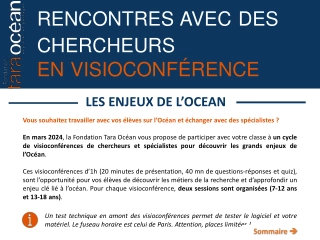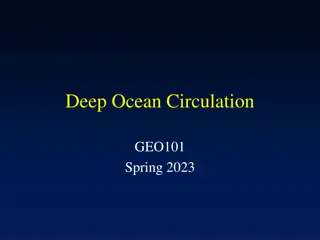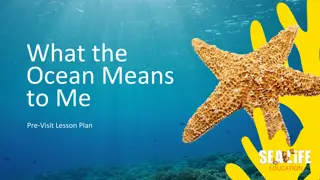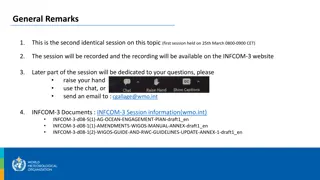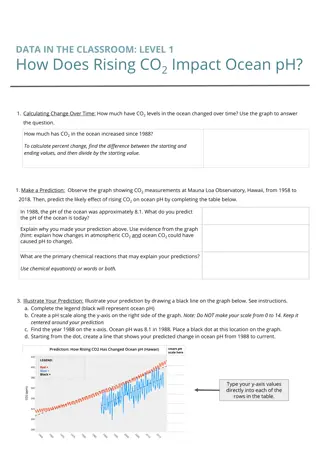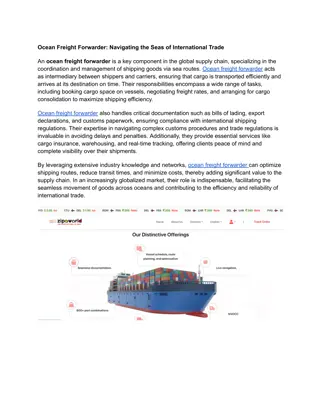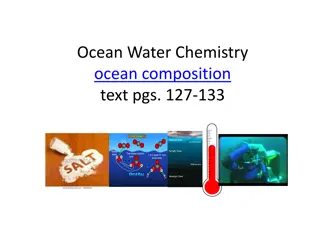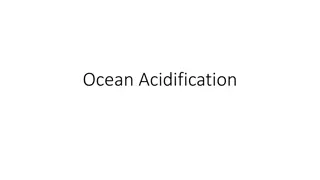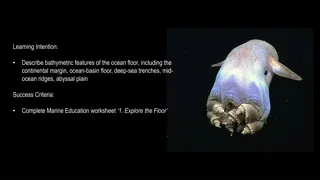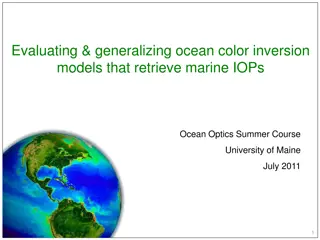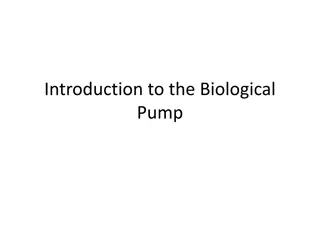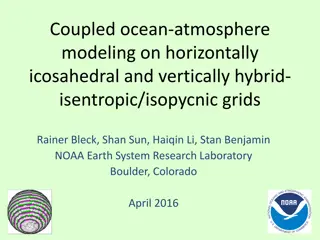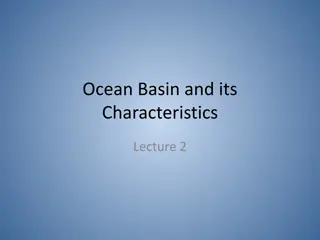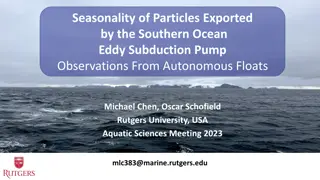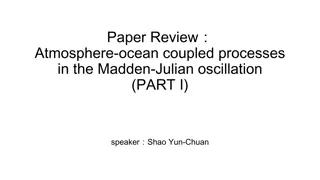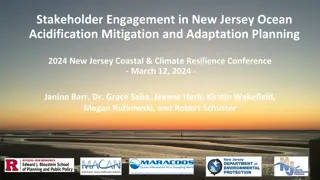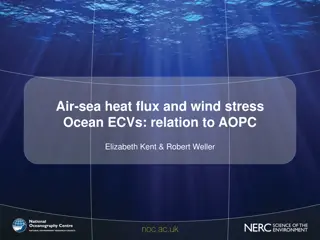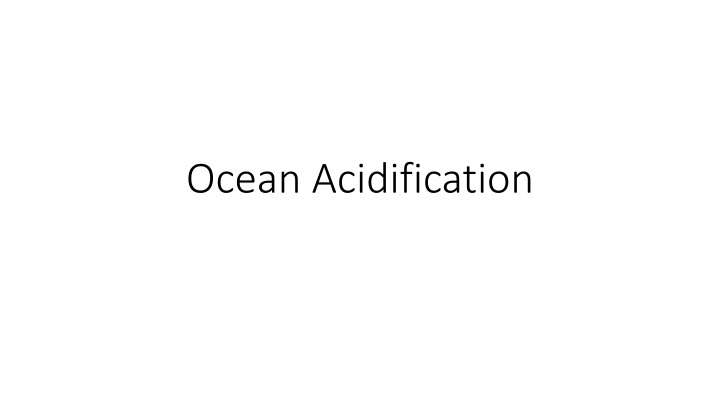
Investigating Ocean Acidification and Coral Reefs
Ocean acidification, caused by increased carbon dioxide levels in the ocean, poses a threat to coral reefs which are vital ecosystems supporting numerous marine species. Human activities like deforestation and vehicle emissions contribute to this phenomenon. Coral reefs are important for marine biodiversity, providing food and shelter to various organisms. Through experiments and simulations, the effects of ocean acidification on coral reefs can be analyzed to understand its impact on marine life.
Download Presentation

Please find below an Image/Link to download the presentation.
The content on the website is provided AS IS for your information and personal use only. It may not be sold, licensed, or shared on other websites without obtaining consent from the author. If you encounter any issues during the download, it is possible that the publisher has removed the file from their server.
You are allowed to download the files provided on this website for personal or commercial use, subject to the condition that they are used lawfully. All files are the property of their respective owners.
The content on the website is provided AS IS for your information and personal use only. It may not be sold, licensed, or shared on other websites without obtaining consent from the author.
E N D
Presentation Transcript
Warm Up 1. What is ocean acidification and why is it happening? Ocean acidification is when oceans are becoming more acidic because of too much carbon dioxide dissolved in the ocean. 2. Identify two human actives that contribute to ocean acidification. Deforestation and fuel emissions from cars, etc. 3. Why are coral reefs important? of ocean species depend on the coral reefs for food and shelter.
Important Definitions Important Definitions Ocean Acidification: When carbon dioxide dissolves in the ocean, and makes the ocean more acidic.
Important Definitions Important Definitions pH: A Chemical scale that measures how acidic or how alkaline a substance is.
Important Definitions Important Definitions Coral Reefs: A coral is a sea animal attached to the ocean floor with a skeleton made of calcium carbonate. Coral reefs are many coral colonies growing together.
LT: I can analyze the effects of ocean acidification on coral reefs by collecting data from a model and drawing conclusions. Main idea: To investigate the effects of ocean acidification on coral reefs through a simulation, collect and analyze the data and draw conclusions. Actionable Steps: I need to understand what ocean acidification and coral reefs are. I need to I need to I need to analyze the data and draw conclusions. I need to carry out the simulation and collect data.
LT: I can analyze the effects of ocean acidification on coral reefs by collecting data from a model and drawing conclusions. Activity: Examining the effects of ocean acidification In this experiment we will examine how acidic conditions affect coral reefs. We will use chalk make of calcium carbonate in place of the corals, and acetic acid to mimic the acidic conditions in the ocean.
LT: I can analyze the effects of ocean acidification on coral reefs by collecting data from a model and drawing conclusions. Research question: What would happen to the biodiversity of coral reefs as the concentration of acid in the ocean increases? Concentration of acid Independent Variable_____________________ Dependent Variable ____________________________ Biodiversity Hypothesis If then because
LT: I can analyze the effects of ocean acidification on coral reefs by collecting data from a model and drawing conclusions. Instructions: 1. Work in pairs 2. One person from the pair should collect the materials. 3. Do not start the experiment until you are instructed to. 4. Listen to directions!
LT: I can analyze the effects of ocean acidification on coral reefs by collecting data from a model and drawing conclusions. Small group roles: 1. Facilitator keep group on track also mindful of time to complete experiment 2. Time keepers time the experiment 3. Materials manager collect and return the supplies 4. Content expert rallies group to answer questions first then ask teachers.
LT: I can analyze the effects of ocean acidification on coral reefs by collecting data from a model and drawing conclusions. 0% 25% 50% 100%
LT: I can analyze the effects of ocean acidification on coral reefs by collecting data from a model and drawing conclusions. Think about: What is the control group? What is the purpose of the 0% acetic acid cup?
LT: I can analyze the effects of ocean acidification on coral reefs by collecting data from a model and drawing conclusions. 180 145 115 85
LT: I can analyze the effects of ocean acidification on coral reefs by collecting data from a model and drawing conclusions.
LT: I can analyze the effects of ocean acidification on coral reefs by collecting data from a model and drawing conclusions. Time Taken for Chalk to Dissolve in Various Acid Concentration 200 180 Time (seconds) 160 140 120 100 80 Time (seconds) 60 40 20 0 0 20 40 60 80 100 120 Concentration of Acid %
LT: I can analyze the effects of ocean acidification on coral reefs by collecting data from a model and drawing conclusions. Analysis: Turn-and-Talk 1. What is the relationship between the amount of time it takes the chalk to dissolve and the concentration of acid? As the concentration of acid increase, the amount of time it takes for the chalk to dissolve decreases.
LT: I can analyze the effects of ocean acidification on coral reefs by collecting data from a model and drawing conclusions. 2. What does this relationship tell you about the effect of ocean acidification on the survival of the coral reefs? 3. Based on your experiment with the calcium carbonate chalk and the acetic acid, what do you think will happen to our coral reefs and their biodiversity as the acidity of the ocean increases due to CO2 emissions? 4. What could humans do to prevent ocean acidification? Hint: Think about activities that are associated with the release of carbon dioxide in to the atmosphere.
LT: I can analyze the effects of ocean acidification on coral reefs by collecting data from a model and drawing conclusions. Conclusion: Answer the research question: What would happen to the biodiversity of coral reefs as the concentration of acid in the ocean increases? Organize your writing using the claim, evidence, concepts and justification format.

